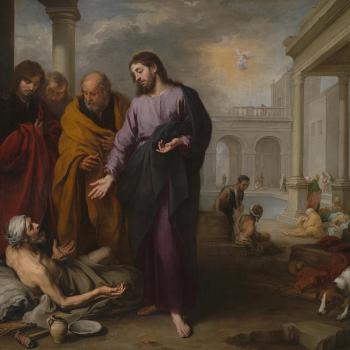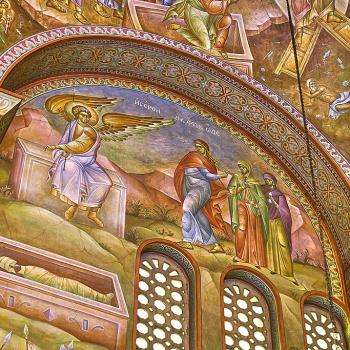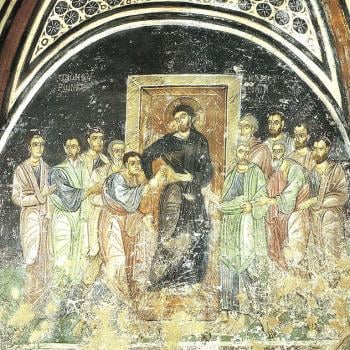Jesus, the author of life, revealed from the cross a truth of the human condition when he showed us the fruit of our actions, what we made of life, was suffering.
This suffering is not God’s intention for us. We abused the freedom he gave us. We had the option to open up to God and all his bounty, to make for ourselves a blessed life which leads into eternal bliss. Likewise, we had the option to look for our joy, our happiness turned away from God, that is, turned inward upon ourselves and upon the transitory goods and pleasures found in the created order of things.
We did not choose wisely.
We chose to grasp after and attach ourselves to that which could not last, to that which could not provide eternal satisfaction. As a result, we got all that we sought, and likewise, we suffered the consequences of our choice. It was not God’s desire for us, but yet, out of his love for us, he made the space for us to act and likewise to receive the fruit of our actions.
Seeking transitory pleasure, we created the conditions which established our pain, our sorrow, our angst. While we enjoy some pleasure today, we forget the cost which comes with it. For every action there is a reaction. For every inordinate pleasure there is a cost, a consequence, which we later feel and experience as suffering. And in ignorance of the cause of our suffering, we end up seeking more pleasure, thinking it will lead to the cessation of our suffering, leading, therefore, to a cycle of pleasure-seeking. Our attempt to gain some pleasure today leads to more suffering, and that suffering leads us to seek new forms of pleasure as a way out of the unpleasantness we find in our life. Thus, turning toward pleasure, we find ourselves not entering the kingdom of heaven with its glory, but stuck in the realm of our making, the realm established out of our desire.[1] But, as St. Maximus the Confessor explained, the cycle began with our first attempt to grasp after pleasure without a previous form of suffering, so that such grasping could be said to be the causeless cause of our whole decline:
All suffering has as its cause some pleasure which preceded it. Hence all suffering is a debt which those who share in the human nature pay natural in return for pleasure. For suffering naturally follows unnatural pleasure in all men whose generation has been preceded by submission to the rule of causeless pleasure. I describe the pleasure that derives from the fall as ‘causeless’ because clearly it has not come about as the result of any previous suffering.[2]
And so the foundation of our suffering is found in our pursuit for some stolen pleasure, for pleasure without cost. All good things come from God, and can be found and properly received in and through God. If we try to take them apart from God, closed off from God and his grace, we take them as thieves and end up destroying ourselves.
And this is how things would have remained if Jesus had not intervened. Life, and life after death, would be forever permeated by suffering. The declaration that life is suffering would be our last word about life. But Jesus came to change this around: “The thief comes only to steal and kill and destroy; I came that they may have life, and have it abundantly” (John 10:10 RSV).
That which has a cause can be ended by removing the cause and conditions which bring it into place. Since the suffering in our life is caused by our actions, this means, at least in theory, our suffering can be brought to an end. The problem with the theory is that our actions have weakened our ability to act, so that, once we have found ourselves caught in the pleasure-pain cycle, we find ourselves shackled in by the results of our actions. We no longer have in and of ourselves the strength to overturn the cause of our suffering. Our initial freedom came from God, but our pursuit for transitory pleasure turned us away from his grace, so that, once closed off from grace, our will is weakened and incapable of repairing the harm done by our initial turn away from God. By acting upon our desire, we become, as it were, fettered, incapable of repairing the harm done by our actions.
But there is hope. Jesus came to bring us abundant life, to turn us away from the suffering we have made for ourselves, to make life no longer about suffering but about the abundance of God’s love. He did this by doing what we could not: he overturned the foundation of suffering in himself, so that the consequences of our sin can be overturned, as St. Hildegard explained, speaking in the voice of God the Father: “And therefore My Son was nailed to the tree, to abolish what had been done through the tree that occasioned sin; and therefore He drank vinegar and gall, to take away the taste of the harmful fruit.”[3]
Similarly, Hans Urs von Balthasar summarized the work of Jesus for our salvation, for our liberation from suffering, in the following way:
(1) The Son gives himself, through God the Father, for the world’s salvation. (2) The Sinless One “changes places” with sinners. While in principle, the Church Fathers understand this in a radical sense, it is only in the modern variations of theories of representation that the consequences are fully drawn out. (3) Man is thus set free (ransomed, redeemed, released). (4) More than this, however, he is initiated into the divine life of the Trinity. (5) Consequently, the whole process is shown to be the result of an initiative on the part of divine love.[4]
Jesus suffered in his death, and took with him, all the suffering of the human condition upon himself. This allowed himself to reconfigure the world and the consequences of our actions in a way which is fitting to God’s justice and yet allows God’s love and mercy to shine through. For, as St. Bonaventure wrote, Jesus took the causes of sin and opposed them with their contrary, which he alone could do:
It is most fitting that contraries should be cured by contraries. Because man, wishing to be as wise as God, sinned by desiring to taste of the forbidden tree and hence, is inclined to pleasure and hardened in presumption, and because of the whole of mankind was thereby infected, lost immortality, and incurred a deserved death, hence that man might be redeemed by a fitting medium, God was made man and wished to be humiliated and to suffer on the tree, and in contrast to the universal infection, to suffer a most general passion; in contrast to pleasure, to suffer a most severe passion; in contrast to a deserved and unwilling death, to suffer an undeserved death voluntarily.[5]
![By anonymous ([1]) [Public domain], via Wikimedia Commons](https://wp-media.patheos.com/blogs/sites/637/2016/03/Hosios_Loukas_narthex_-_East_wall_right_Harrowing_of_Hell_03-300x208.jpg)
The Lord revealed His wisdom by the way in which He healed man, becoming man without the slightest change or mutation. He demonstrated the equity of justice when in His self-abasement He submitted deliberately to the sentence to which what is passible in human nature is subject, and made that sentence a weapon for the destruction of sin and of the death which comes through sin – that is, for the destruction of the pleasure and of the pain which pleasure engenders. It was in this pleasure-pain syndrome that the dominion of sin and death lay: the tyranny of sin committed in pursuit of pleasure, and the lordship of the painful death consequent upon sin. [6]
He who was able to counter the cause of all suffering now tells us in and through his resurrection that life no longer has to be about suffering. Our suffering can cease and we can, with him and his help, overturn all the causes of suffering in our life, all the things we do which close us from the glory of God. We can now open up to God once again and find ourselves taken with Jesus into eternal glory, ceasing to be stuck in the realm of desire. For now the Word provides the final answer about the human condition, and that answer is the truth of glory – suffering has an end, but eternal life does not.
[1] That is, the realm of desire.
[2] St. Maximos the Confessor, “Fourth Century of Various Texts” in The Philokalia: The Complete Text. Volume Two. trans. G.E.H. Palmer, Philip Sherrard and Kallistos Ware (London: Faber and Faber, 1990), 244.
[3] St. Hildegard von Bingen, Scivias. trans. Mother Columbia Hart and Jane Bishop (New York: Paulist Press, 1990), 336.
[4] Hans Urs von Balthasar, Theo-Drama IV: The Actions. trans. Graham Harrison (San Francisco: Ignatius Press, 1994), 317.
[5] St. Bonaventure, Breviloquium. trans. Erwin Esser Nemmers (St. Louis, MO: B. Herder Book Co., 1946),132.
[6] St. Maximos the Confessor, “Fourth Century of Various Texts,” 246.
Stay in touch! Like A Little Bit of Nothing on Facebook:
A Little Bit of Nothing













